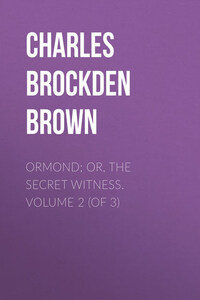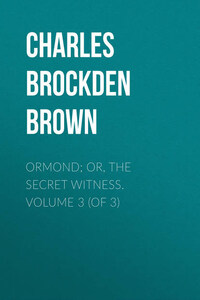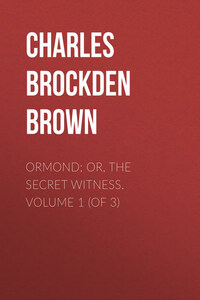On leaving Mr. Ormond's house, Constantia was met by that gentleman. He saw her as she came out, and was charmed with the simplicity of her appearance. On entering, he interrogated the servant as to the business that brought her thither.
"So," said he, as he entered the drawing-room, where Craig was seated, "you have had a visitant. She came, it seems, on a pressing occasion, and would be put off with nothing but a letter."
Craig had not expected this address, but it only precipitated the execution of a design that he had formed. Being aware of this or similar accidents, he had constructed and related on a previous occasion to Ormond a story suitable to his purpose.
"Ay," said he, in a tone of affected compassion, "it is a sad affair enough. I am sorry it is not in my power to help the poor girl. She is wrong in imputing her father's misfortunes to me, but I know the source of her mistake. Would to heaven it was in my flower to repair the wrongs they have suffered not from me, but from one whose relationship is a disgrace to me."
"Perhaps," replied the other, "you are willing to explain this affair."
"Yes, I wish to explain it. I was afraid of some such accident as this. An explanation is due to my character. I have already told you my story. I mentioned to you a brother of mine. There is scarcely thirteen months difference in our ages. There is a strong resemblance between him and me in our exterior, though I hope there is none at all in our minds. This brother was a partner of a gentleman, the father of this girl, at New York. He was a long time nothing better than an apprentice to Mr. Dudley, but he advanced so much in the good graces of his master, that he finally took him into partnership. I did not know till I arrived on the continent the whole of his misconduct. It appears that he embezzled the property of the house, and fled away with it, and the consequence was, that his quondam master was ruined. I am often mistaken for my brother, to my no small inconvenience: but all this I told you formerly. See what a letter I just now received from this girl."
Craig was one of the most plausible of men. His character was a standing proof of the vanity of physiognomy. There were few men who could refuse their confidence to his open and ingenuous aspect. To this circumstance, perhaps, he owed his ruin. His temptations to deceive were stronger than what are incident to most other men. Deception was so easy a task, that the difficulty lay, not in infusing false opinions respecting him, but in preventing them from being spontaneously imbibed. He contracted habits of imposture imperceptibly. In proportion as he deviated from the practice of truth, he discerned the necessity of extending and systematizing his efforts, and of augmenting the original benignity and attractiveness of his looks, by studied additions. The further he proceeded, the more difficult it was to return. Experience and habit added daily to his speciousness, till at length the world perhaps might have been searched in vain for his competitor.
He had been introduced to Ormond under the most favourable auspices. He had provided against a danger which he knew to be imminent, by relating his own story as if it were his brother's. He had, however, made various additions to it, serving to aggravate the heinousness of his guilt. This arose partly from policy, and partly from the habit of lying, which was prompted by a fertile invention, and rendered inveterate by incessant exercise. He interwove in his tale an intrigue between Miss Dudley and his brother. The former was seduced, and this man had employed his skill in chirographical imitation, in composing letters from Miss Dudley to his brother, which sufficiently attested her dishonour. He and his brother, he related, to have met in Jamaica, where the latter died, by which meant his personal property and papers came into his possession.
Ormond read the letter which his companion presented to him on this occasion. The papers which Craig had formerly permitted him to inspect had made him familiar with her handwriting. The penmanship was, indeed, similar, yet this was written in a spirit not quite congenial with that which had dictated her letters to her lover. But he reflected that the emergency was extraordinary, and that the new scenes through which she had passed, had, perhaps, enabled her to retrieve her virtue and enforce it. The picture which she drew of her father's distresses affected him and his companion very differently. He pondered on it for some time in silence; he then looked up, and with his usual abruptness said, "I suppose you gave her something?"
"No. I was extremely sorry that it was not in my power. I have nothing but a little trifling silver about me. I I have no more at home than will barely suffice to pay my board here, and my expenses to Baltimore. Till I reach there I cannot expect a supply. I was less uneasy I confess on this account, because I knew you to be equally willing and much more able to afford the relief she asks."










